

Plagiarism - Virtual Library. CSU Library. How To Recognize A Fake News Story. Bertrand Russell's 10 Essential Rules Of Critical Thinking - Bertrand Russell's 10 Essential Rules Of Critical Thinking - 6 Steps to Teaching Students to Search - Teacher Tech. Please feel free to use this resource with students or in teacher trainings.
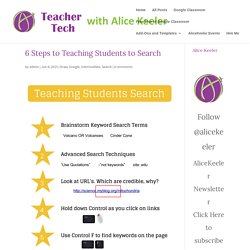
Please do not republish to your blog. Link to Google Drawing: The new literacy is to teach students how to search. Rather than giving students answers, we ask really good questions. Students then use advanced search techniques to find the answers. Students are likely going to struggle with answering essential questions. Start students off by learning advanced search techniques. These suggestions are not intended to be done in a single day unless this is the content you are teaching.
Ask a good essential question that you have no intention of answering with the students. Ask the students what keywords they would use in a Google search to answer this question. A keyword is a word that is actually present on the web page. Consider plural and non-plural words. Consider the order of the words. Identify other words that may be used. Do NOT Search Questions Have students critique each other’s reasoning. Credibility. Research Tip: Start with an Image Search - Teacher Tech.
When trying to find information on a new topic one is likely to use a search engine such as Google or Bing.
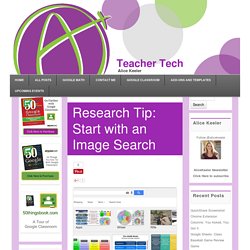
The results will be a text based list of websites that probably talk about that topic. 21st-Century PD: Retention, Reflection, and Redistribution of Knowledge. The explosion of information available to educators for supporting classroom instruction is at an all-time high.
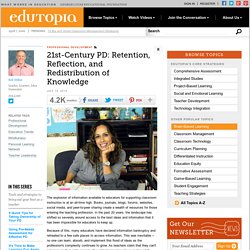
Books, journals, blogs, forums, websites, social media, and peer-to-peer sharing create a wealth of resources for those entering the teaching profession. In the past 20 years, the landscape has shifted so severely around access to the best ideas and information that it has been impossible for educators to keep up. Most Popular of 2015, No. two: The advanced Google searches every student sho... The internet presents our students with the significant challenge of learning how to access and synthesize massive amounts of information from all over the world.
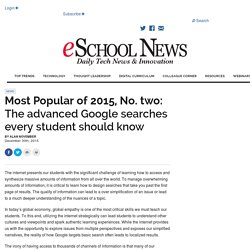
To manage overwhelming amounts of information, it is critical to learn how to design searches that take you past the first page of results. The quality of information can lead to a over simplification of an issue or lead to a much deeper understanding of the nuances of a topic. In today’s global economy, global empathy is one of the most critical skills we must teach our students. To this end, utilizing the internet strategically can lead students to understand other cultures and viewpoints and spark authentic learning experiences. While the internet provides us with the opportunity to explore issues from multiple perspectives and exposes our simplified narratives, the reality of how Google targets basic search often leads to localized results. Let’s take a look at a detailed example assignment, “the Iranian Hostage Crisis.”
Advanced Google features and Search Engine alternatives - Research vs. Searching. Google’s official blog post outlining the new Google, plus Search Your World service explains some of the benefits of integrating crowd-sourced, social-inputs to your search queries: Say you’re looking for a vacation destination.
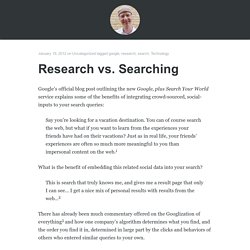
You can of course search the web, but what if you want to learn from the experiences your friends have had on their vacations? Just as in real life, your friends’ experiences are often so much more meaningful to you than impersonal content on the web. What is the benefit of embedding this related social data into your search? This is search that truly knows me, and gives me a result page that only I can see… I get a nice mix of personal results with results from the web… There has already been much commentary offered on the Googlization of everything and how one company’s algorithm determines what you find, and the order you find it in, determined in large part by the clicks and behaviors of others who entered similar queries to your own.
The Student’s Survival Guide to Research - Books / Professional Development -... Spike - Real-Time Content Discovery for Newsrooms, Marketers & PR. Avoiding "Learned Helplessness" We all have students that just want to "get it right.
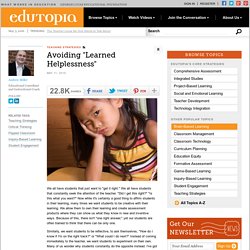
" We all have students that constantly seek the attention of the teacher. "Did I get this right? " "Is this what you want? " Now while it's certainly a good thing to affirm students in their learning, many times we want students to be creative with their learning. We allow them to own their learning and create assessment products where they can show us what they know in new and inventive ways. Similarly, we want students to be reflective, to ask themselves, "How do I know if I'm on the right track? " Curate and Create Learning Resources If we want to have students seek out other information from sources other than the teacher, then we must make sure those resources are available. Questions "For" (Not "About") Learning What do I mean by this? What else could you try? Questions are powerful tools for helping students own the process of learning. Stop Giving Answers Allow for Failure. NeverEndingSearch — @joycevalenza by Joyce Valenza.
Research Tools - Springfield Township H.S. Virtual Library - Spartan Guides f... Rules for Using In-Text Documentation 1.
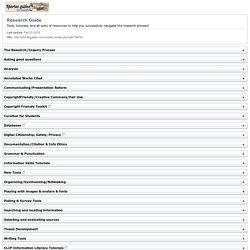
Use the author's last name and give the page number in parentheses. Do not use "page" or abbreviations for page, just write the number. In most cases you will be citing one or two pages, leading your reader to a specific piece of information. Allow one space before the parentheses but none after it if a period follows. EX: Thomas Hardy's Return of the Native is the penultimate example of coincidence (Ellman 89). 2. EX: Animal imagery conveys the primitive, uncontrolled rage that the peasants feel. 3. Teach Your Students How to Successfully Begin a Research Project.